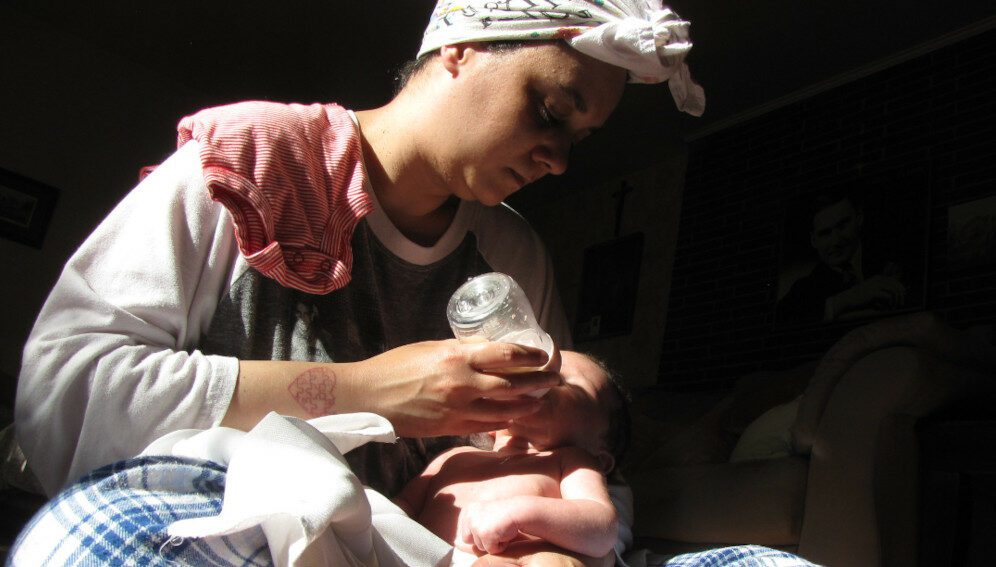25/02/22
Health workers ‘given incentives’ to push baby formula

By: Dann Okoth
Send to a friend
The details you provide on this page will not be used to send unsolicited email, and will not be sold to a 3rd party. See privacy policy.
‘Pervasive, misleading and aggressive’ marketing of powdered baby milk is damaging child health across middle- and lower-middle-income countries, a UN report has warned.
Ditching the use of powdered baby milk – known as formula milk – and replacing it with breastfeeding could prevent an estimated 800,000 deaths of children under five and 20,000 breast cancer deaths among mothers each year, WHO and UNICEF said in a report published earlier this week (Tuesday).
Swiss food company Nestle – which has for decades been the target of a consumer boycott over the issue – continues to market baby formula for infants under six months old but will stop at the end of this year, Marie Chantal Messier, head of food and industry affairs for the company, said.
“We market breastmilk substitutes responsibly and comply with the WHO Code as implemented by national governments or our industry-leading Nestle Policy, whichever is stricter,” she said.
“This report shows very clearly that formula milk marketing remains unacceptably pervasive, misleading and aggressive.”
Tedros Adhanom Ghebreyesus, WHO director-general
“In 2020, UN agencies and certain civil society organisations invited companies to take further commitments in relation to the WHO Code. In response, we decided to unilaterally stop the promotion of infant formula in all countries for babies aged zero to six months by end of 2022,” she added.
The International Code of Marketing of Breastmilk Substitutes was adopted by the World Health Assembly in 1981 to protect parents from aggressive marketing practices.
Profits before babies
However, the US$55 billion formula milk industry continues to put profits before infant health, according to the report.
“This report shows very clearly that formula milk marketing remains unacceptably pervasive, misleading and aggressive,” said WHO director-general Tedros Adhanom Ghebreyesus.
The analysis was based on surveys of 8,500 parents and pregnant women and 300 health workers in urban areas across Bangladesh, China, Mexico, Morocco, Nigeria, South Africa, Vietnam, and the United Kingdom.
It found that women were substantially more likely to choose formula feeding after being exposed to marketing for breast-milk substitutes. Yet a majority of the women, including up to 98 per cent in Bangladesh, expressed a strong desire to breastfeed exclusively.
Myths
Marketing messages were often laced with myths about breastfeeding and breast milk, according to the report, including claims that formula is necessary in the first days after birth, that breast milk alone is inadequate for infant nutrition, and that formula keeps infants fuller for longer.
“One of the most dominant findings across countries was how science was used to validate and give confidence to and endorse the products, yet the evidence presented was not consistent with the established science,” said Nigel Rollins, head of the WHO’s Department of Maternal Newborn, Child and Adolescent Health.
Unregulated and invasive online targeting and sponsored advice networks and helplines that breach international standards are among the tactics employed by the industry to influence parents’ decisions on how to feed their babies, the report claims.
Online campaigns aim to engage women early in their pregnancies to create brand loyalty that will last through their children’s infancy, toddler years and beyond.
“There is increasing use of digital media in formula feed marketing, especially social media,” said Sonia Hernández, a maternal health specialist from Mexico.
“This is critical because in many places, including in Mexico, this platform is not regulated and poses quite a challenge when it comes to enforcement,” she added.
Free gifts
Even more worrying, according to the report, is the way the industry “systematically targets” health professionals to push its products.
“[Health professionals] were incentivised, sometimes with commission from sales, free gifts, and a range of inducements, to endorse the products,” Rollins explained.
In Nigeria, over one third of surveyed pregnant women said they received recommendations to formula feed by a health professional.
In Bangladesh, 72 per cent of women who exclusively formula fed received a recommendation to feed formula from a health professional, compared to 18 per cent among women who breastfed, according to the report.
“There is [a] need to step up campaigns to protect, promote and support exclusive breastfeeding for children less than six months [old] for optimal growth,” said Anne Gitimu, programme director for reproductive maternal newborn and adolescent health and nutrition at Amref Health Africa in Kenya.
This piece was produced by SciDev.Net’s Global desk.















